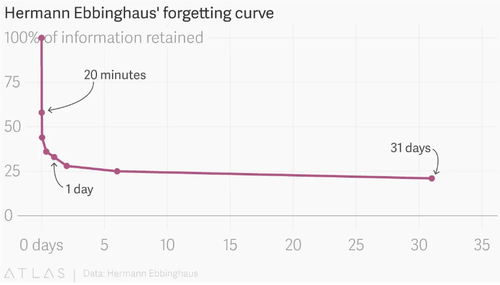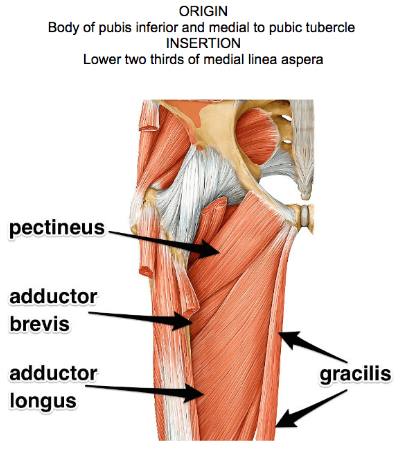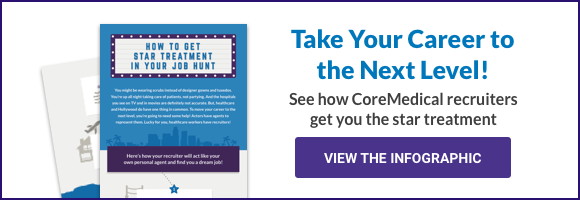
Whether you are just beginning PT school, or you are closely approaching your destiny with the NPTE, you want to maximize the effectiveness of your studying. This means you need to memorize more information in less time. If you are so worried about studying enough today that you don’t believe you have time to read this article, then you definitely need to read this article! Let me begin by introducing you to your new best friends: spaced repetition and active recall.
What is spaced repetition?
Spaced repetition has actually been around for a long time and is well validated as a highly effective learning strategy.1-3 I like this definition presented by Bartosz Czekala, a memory enthusiast:
“Spaced repetition is a learning technique that incorporates increasing intervals of time between subsequent review of previously learned material in order to exploit the psychological spacing effect”
Reviewing previously learned material repeatedly over increasing intervals is crucial to saving you time and enhancing your memory. Why? Let’s introduce Hermann Ebbinghaus’ revolutionary forgetting curve:

Now this might not look extraordinary, but our friend Ebbinghaus demonstrated how quickly we forget everything we memorized in that cramming session last night. His research revealed that we humans reliably forget around 75% of everything we learn within just a few days. Yikes.
Spaced repetition is the antithesis to our forgetfulness. By reviewing memorized material just before we forget it, we are able to maintain an impressive amount of information while needing to review the material less and less frequently. This process leads to long term retention of important facts that requires little time thanks to the help of spaced repetition software (SRS). More on SRS shortly.
What is active recall?
Our other best friend of equal importance is active recall. This is the practice of retrieving a fact from your memory, as compared to passive recall in which you re-read the fact. Active recall leads to greater retention compared to passive recall,4-6 which is well stated by philosopher William James:
“A curious peculiarity of our memory is that things are impressed better by active than by passive repetition. I mean that in learning, when we almost know the piece, it pays better to wait and recollect by an effort within, than to look at the book again. If we recover the words the former way, we shall probably know them the next time; if in the latter way, we shall likely need the book once more.”
Even if you have been exposed to something hundreds or thousands of times, you would probably struggle to fully remember it if you haven’t actively recalled it. Let’s give it a try. Without taking a cheating peek, I want you to picture your own toothbrush in your mind. Now draw your toothbrush without missing a single detail.
Try to capture every color and line and design exactly. Don’t just picture it in your mind, you actually need to draw it. Now compare it to the real thing. How did you do? Are you surprised by how difficult that was? If you did this exercise several times over the next few days and weeks using spaced repetition and active recall, you would know that toothbrush all too well!
What I want us to understand is this critical time and stress saving revelation: you can read a fact hundreds of times and still not remember it well. Or you can actively recall that fact five times over a spaced interval of a few months and have it stored in your long term memory for easy recall. Now we’re saving time, decreasing sleepless fact-cramming nights, and enhancing memory!
What is Spaced Repetition Software (SRS) app?
You may have asked yourself the question, “This spaced repetition thing sounds all wonderful, but how am I supposed to know how to space out everything I’ve learned so that I review the fact just before I forget it? That sounds impossible!” Introducing SRS. These are software programs that do all of that seemingly impossible work for you. There are several apps out there but my personal favorite is Anki (which is free to download on any computer, and the mobile version is free on Android but unfortunately not free with Apple).
To use Anki, I create flashcards of what I want to continually review. When I see a flashcard I try to answer the question I created and then I click to see the answer (active recall). I then indicate if my answer was correct and how difficult it was for me. Then Anki calculates when I need to see that flashcard next based on how many times I have reviewed it and how well I have done correctly answering the question (spaced repetition). The more I review the card and correctly answer the question, the longer until I see it again. This way I don’t waste time studying what I know well while being prompted to remember everything I have learned so I don’t forget it. It’s genius!
I used Anki during the final years of PT school and it dramatically decreased my overall studying time while improving my long term retention. Using Anki, I would review the important facts from each class for 5-10 minutes each day all semester. Then, come exam time, I no longer needed to cram the day before. I already had everything memorized and organized in my mind. This allowed me to spend more time learning new information and developing increased understanding of what we were learning. It made an incredible difference in my daily schedule, my level of understanding, and on my stress levels!
But what was the best discovery that I wasn’t expecting when I started using Anki? It made studying for the NPTE feel like a breeze. I had already been memorizing all the facts I needed for the exam for the last few years in school and reviewing them in small, easy to digest chunks, every day. All I had to do was add in a few more facts from a review book and I had the rest completely committed to memory. Again, no cramming needed! I was able to take the exam in the middle of my final clinical rotation without taking any extra time off to study.
How to maximize your time with SRS
Now that we understand how effective SRS can be, let’s dig into how to use it to your greatest advantage:
- SRS is best for reviewing information that you have already learned and understand. It’s not helpful to try and memorize something you don’t understand. Besides, it is much easier to remember something that is meaningful to you.
- Keep the questions and answers on the cards short and direct. One of your biggest mistakes would be making your cards too wordy, or trying to ask questions that require several answers on one card. SRS is incredible for memorizing hard facts like anatomy, biomechanics, lab values, pediatric stages, etc.
- You’ll generally benefit best by creating the cards yourself. You can share decks of cards with your friends or grab premade cards online, but it just isn’t the same. The time you spend upfront creating the cards (which can feel tasking when you first get started) will pay dividends in saving you time and comprehension later.
- For subjects with large amounts of similar information, like anatomy, use the same template to make things easier for your mind to process. For my anatomy cards I formatted the question and answer sides of the flashcard exactly the same for every muscle, including a picture on the answer side. Here’s an example of one of my anatomy cards:

- If you keep getting the same card wrong you need to stop and change something. Either it’s not meaningful to you and you need to understand it better, or the question and answer isn’t short and direct enough. One of the great things about using SRS is that it will expose things you don’t understand well. Use that to your advantage and take the time to stop and learn the subject deeper until you do understand it. Then you’ll get the card right every time and feel great about yourself.
- This last tip is a good study tip in general, and obviously applies to reviewing cards in an SRS app. Set aside 60-90 minutes of focused, distraction free study time, and then take a decent break of 15-30 minutes before coming back. Anders Ericsson has great things to say about developing expertise, and he says that deliberate practice is crucial to becoming an expert in anything. He also says that deliberate practice is “a highly structured activity” and that it “requires effort and is not inherently enjoyable.” That statement usually makes me chuckle, mostly because we all know it is true. Studying for 90 minutes without a youtube video or texting break can be tough, but it will save you time and energy later and facilitate your climb to school and NPTE success.
Conclusion
Unfortunately with the pressure of regular exams we tend to push smart study strategies to the side and prefer to cram our studying at the last minute. This leads to survival on the current exam but we quickly forget much of what we have memorized and have to continually re-memorize before our midterms, finals, and especially the NPTE. This process is time consuming and stressful, is it not?
Using free SRS apps that incorporate study through active recall and spaced repetition will save you time, stress, and make it easier for you to actually retain everything you learn during PT school. You will spend far less total time studying for the NPTE since you won’t have to keep relearning everything for the third time. Come NPTE time, you’ll have most of the facts you need so ingrained in your mind that you won’t even think twice about passing that exam!
(Have additional tips on using SRS for PT school and the NPTE? Comment below!)
References:
- Bahrick, HP & Hall, LK. The importance of retrieval failures to long-term retention: A metacognitive explanation of the spacing effect. Journal of Memory and Language, 2005;52(4):566-577.
“The spacing effect is one of the oldest and best documented phenomena in the history of learning and memory research.”
- Carpenter, SK, Cepeda, NJ, Rohrer, D, Kang, SH, & Pashler, H. Using spacing to enhance diverse forms of learning: Review of recent research and implications for instruction. Educational Psychology Review, 2012;24(3):369-378.
- Thalheimer, W. (2006). Spacing learning events over time: What the research says. Work-Learning Research, 2006;1:1-54.
- Slamecka, NJ & Graf, P. The generation effect: Delineation of a phenomenon. Journal of experimental Psychology: Human learning and Memory, 1978;4(6):592.
- Craik, FI & Watkins, MJ. The role of rehearsal in short-term memory. Journal of verbal learning and verbal behavior, 1973;12(6):599-607.
- Karpicke, JD & Roediger, HL. The critical importance of retrieval for learning. Science, 2008;319(5865):966-968.
